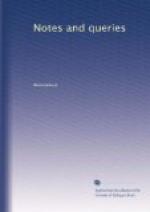M.
Weights for Weighing Coins.—A correspondent wishes to know at what period weights were introduced for weighing coins.
He has met with two notices on the subject in passages of Cottonian manuscripts, and would be glad of farther information.
In a MS. Chronicle, Cotton. Otho B. xiv.—
“1418. Novae bilances instituuntur ad ponderanda aurea Numismata.”
In another Cottonian MS., Vitell. A. i., we read—
“1419. Here bigan gold balancis.”
H.E.
Shunamitis Poema.—Who was the author of a curious small 8vo. volume of 179 pages of Latin and English poems, commencing with “Shunamitis Poema Stephani Duck Latine redditum?”
The last verse of some commendatory verses prefixed point out the author as the son of some well-known character:
“And sure that is the most distinguish’d
fame,
Which rises from your own, not father’s
name.
London, 21 April, 1738.”
My copy has no title-page: a transcript of it would oblige.
E.D.
Lachrymatories.—In many ancient places of sepulture we find long narrow phials which are called lachrymatories, and are supposed to have been receptacles for tears: can you inform me on what authority this supposition rests?
J.H.C.
Egg-cups used by the Romans.—That the Romans used egg-cups, and of a shape very similar to our own, the ruins at Pompeii and other places afford ocular demonstration. Can you tell me by what name they called them?
J.H.C.
Sir Oliver Chamberlaine.—In Miss Lefanu’s Memoirs of Mrs. Frances Sheridan, the celebrated authoress of Sidney Biddulph, Nourjahad, and The Discovery, and mother of Richard Brinsley Sheridan, it is stated that “her grandfather, Sir {327} Oliver Chamberlaine,” was an “English baronet.” The absence of his name in any of the Baronetages induces the supposition, however, that he had received only the honour of knighthood; and the connexion of his son with Dublin, that the statement of Whitelaw and Walsh, in their history of that city, may be more correct,—viz. that “Sir Oliver Chamberlaine was descended from a respectable English family that had been settled in Dublin since the Reformation.” I should be glad to be informed on this point, and also respecting the paternity of this Sir Oliver, who is not only distinguished as one of the progenitors of the Sheridans, but also of Dr. William Chamberlaine, the learned author of the Abridgement of the Laws of Jamaica, which he for some time administered, as one of the judges in that island; and of his grandson, the brave, but ill-fated, Colonel Chamberlaine, aide-de-camp to the president Bolivar.
J.R.W.
October 10. 1850.
Meleteticks.—In Boyle’s Occasional Reflections (ed. 1669), he uses the word meleteticks (pp. 8. 38.) to express the “way and kind of meditation” he “would persuade.” Was this then a new word coined by him, and has it been used by any other writer?




